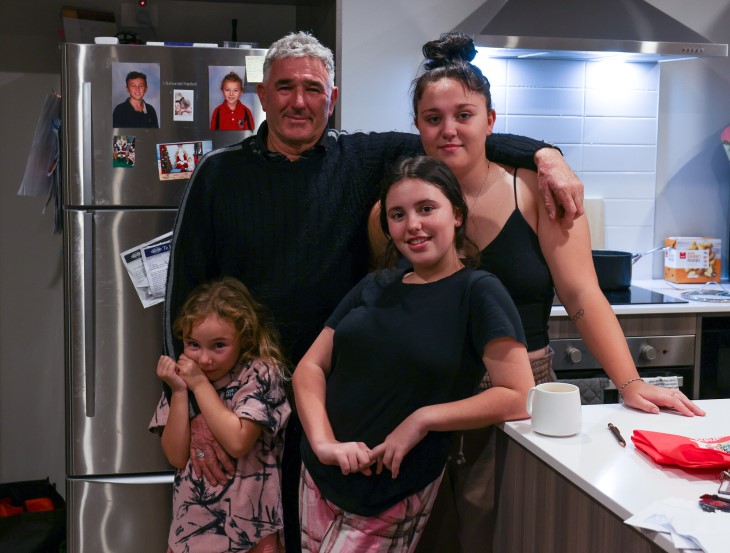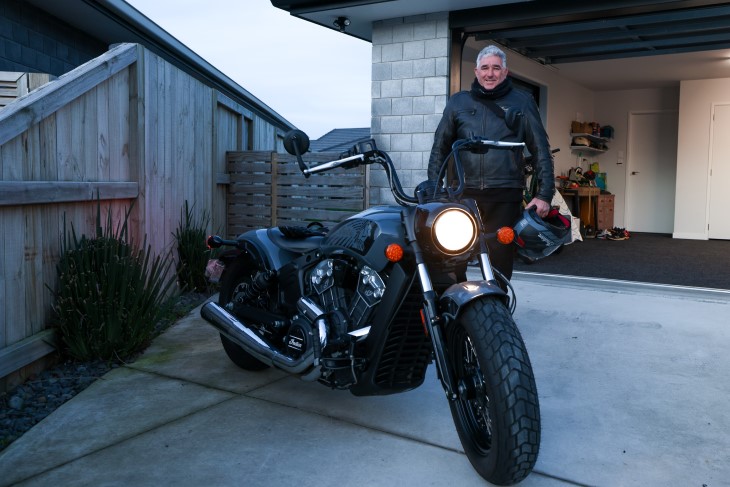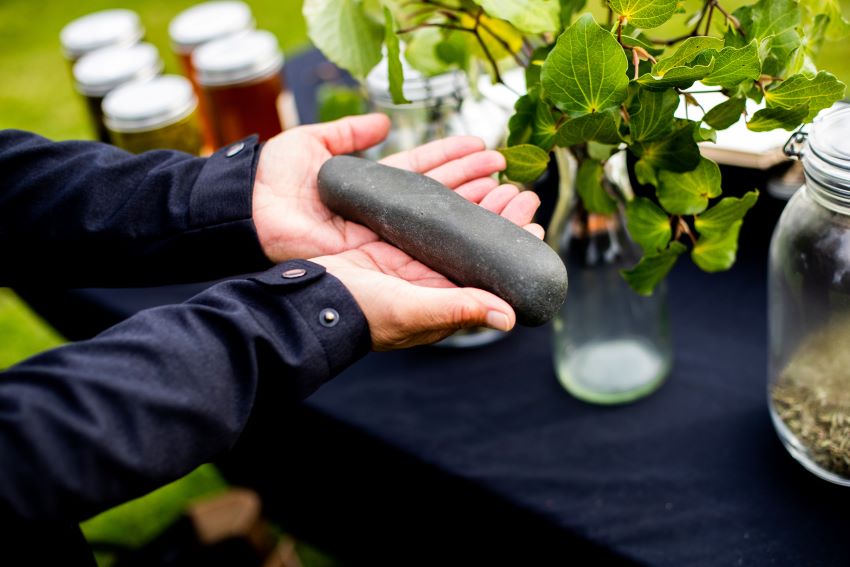Michael's story: From the depths of despair to hitting the waves
A back injury put the working life of Michael Dixon (Ngāpuhi) into doubt and he struggled mentally. But our support helped pull him out of that and find a new job he loves.
Veteran surfer Michael Dixon is sitting on his board as he waits to catch a wave at Mount Maunganui, one of the most beautiful spots in the country.
It’s a stunning setting but Michael is worried. It’s over a year since he was in the water on a surfboard and he was struggling to walk properly until only a few months ago.
Would his surfing skills all come back to him? Has he lost his balance? At 68, he knows he’s no spring chicken and the back injury that has kept him out of action for so long has sapped his confidence.
Despite the ‘mushy’ conditions, he spots an ideal wave on the horizon and plucks up the courage to catch it.
With a heady mixture of adrenaline and relief coursing through his body, he rides the wave in style all the way back to the sandy beach.
“I was on top of the world, it felt like I’d never been off the board,” he says, a smile spreading across his face as he recalls that special moment.
“It was so good to get that feeling back – us surfers call it the stoke.”
The ’stoke’ is defined as a sense of exuberance felt by surfers during and after a thrilling session in the waves.
Michael had been chasing the stoke ever since seriously injuring his spine at work. Had it not been for the support of ACC, he might never have got the stoke back.
“ACC have just been amazing, they’ve backed me all the way and have offered me every little thing,” he says.

‘You need to see a doctor’
They say lightning doesn’t strike twice but Michael could be forgiven for not believing that.
With the help of ACC, he had finally returned to his job as a concrete layer after recovering from knee replacement surgery when disaster struck again – literally on his first day back on the tools.
“I was finishing off a floor with a power float, which is what we use to smooth it out,” he explains.
“But then I stepped backwards off the floor and into a post hole – there was a big crack when I hit the ground.”
Michael initially tried to put up with the pain in his back and tough it out for the following days. But it soon became clear something wasn’t right.
“I couldn’t bend down, I couldn’t lift stuff. Everything was just a mission and it was painful all the time. But I just kept working because I was worried how things would work out for me if I had to stop,” he says.
“Eventually, the pain got so bad that I just couldn’t do anything and my boss said, ‘Look, I think you need to go and see your doctor’.”

‘I’m not ready to give up work’
The official diagnosis was soft tissue damage and a lumbar disc prolapse – not good news for someone with such a physically-demanding occupation.
Injuries relating to prolapsed, or ‘slipped’, discs are common in jobs involving heavy lifting and can cause severe back pain as the disc often presses on a nerve root.
With Michael well into his seventh decade and past New Zealand’s unofficial retirement age, his working future was now looking bleak.
“I was very down and despondent about it,” he admits.
“Working has been my whole life and I’ve always had a job, right from when I left school at 16. I’ve still got a lot of life ahead of me and I didn’t want to sit around and do nothing.”
Hāpai offers a helping hand
Fortunately for Michael, ACC was there again to help him through these difficult times.
We supported Michael with Hāpai – an initiative aimed at meeting the needs of injured Māori and their whānau in a culturally appropriate way.
Te Pihinga (the fledgling) stage of Hāpai involves seven recovery team members supporting 275 kiritaki Māori in Whakatane, Tauranga, Rotorua and Gisborne. Insights gained from this phase are being used to expand the service across the motu.
As part of the Hāpai programme, we helped Michael return to work but the physical nature of concrete laying proved too taxing as he struggled to recover from his injury.

“That was tough to deal with because I didn’t want to give it up – I loved that job and all the guys I worked with were great,” he says.
“I was beginning to wonder if I’d ever come out the other side or would ever be able to work again – that was my biggest fear.”
Looking on the positive side
Previously very active and sprightly for his age, Michael also struggled to deal with having limited mobility during his recovery and his mental health soon suffered.
“I couldn’t really walk properly for a while, which was frustrating because I’m quite a physical person,” says Michael, who lives in Papamoa with his adult daughter and 12-year-old granddaughter.
“I like my surfing, going out on my bike and stuff like that – I just enjoy keeping physically fit. And I like to have the freedom to get out and do what I want to do.”
We provided counselling to Michael and that helped free him from a dark place.
“For most of my life, I’ve always tried to look on the positive side of things. But I started to feel deep down that nothing was going to work,” he says.
“I was ready to give up at one stage but seeing the psychologist made a big difference. Things became a lot clearer and I walked out of those sessions more and more positive each time.”

Turning to traditional healing
Expert medical advice and physio also played a key role in getting Michael back to leading a full life. But it was another one of our services that gave him a real boost.
Michael was offered the opportunity to try rongoā Māori – the traditional Māori healing used by his ancestors.
Rongoā includes a range of different healing methods, including mirimiri and romiromi (bodywork), whitiwhiti kōrero (support/advice) and karakia (prayer).
“I jumped at the chance and it was just amazing,” he says.
“Everything freed up for me and I felt a lot better. I could move more freely, so was able to work harder with the physio at the gym and that strengthened everything up again.”

A fresh start in recycling
The biggest turning point came when Michael applied for a part-time job at the Te Puke Recycling Centre.
Far less physical than concrete laying, it sounded like an ideal opportunity. But there were a couple of hurdles to overcome if Michael was to return to the work force.
Given his advancing years and the fact he had just been through two serious injuries, his potential new employers weren’t sure if he would be up to the job.
The support of ACC was crucial – we helped him get a forklift licence and arranged a trial period.
“In the interviews, he was the best candidate and we didn’t want his injury to stop him from getting the job,” says Ilze Kruis, Resource Recovery and Waste Team Leader for the Western Bay of Plenty District Council.
“Without ACC supporting Michael and us coming on board to give him a chance, it probably would have been quite difficult for him to actually be re-employed.”
Free to enjoy the golden years
Michael is now in the final stages of his return-to-work programme, with ACC continuing to provide ongoing physiotherapy and the guidance of an occupational therapist.
“I love my new job and it’s worked out so well for me,” he says.
“I enjoy the social side of the role, we get about 250 to 300 people coming through every day so it’s great to be able to talk to them and show them where all the different bits of recycling go.
“And it’s good fitness because you do a lot of walking – the plant is bigger than a football field.”
Michael doubts he would be where he is now without the support of ACC.
“To tell you the truth, I don’t think I’d be working at the moment, I’d probably be sitting around at home and in a bad place mentally,” he admits.
“Now I’m free to enjoy the rest of my life.”

Mental Health - Where to get help
If it is an emergency and you or someone else is at risk, call 111.
For information and support:
Lifeline: Call 0800 543 354 or text 4357 (HELP)
Suicide Crisis Helpline: Call 0508 828 865 (0508 TAUTOKO)
Need to talk? Call or text 1737
Depression helpline: Call 0800 111 757 or text 4202
All services are free and available 24/7.
For more information and support, talk to your local doctor, hauora, community mental health team or counselling service.
The Mental Health Foundation has more helplines and service contacts on its website.
Mental Health Foundation - Helplines and local mental health services




